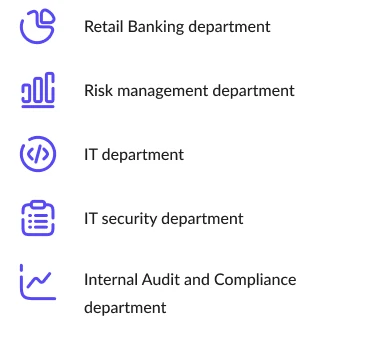
5 Factors
to consider when purchasing a scoring calculation platform

. Executive Summary
This e-book provides a comprehensive guide for purchasing a scoring calculation platform for your company.
It outlines the different departments that would use the platform and lists the specific business needs of each department. It also discusses the importance of functional and non-functional requirements for the platform.
. Stakeholders
This e-Book provides a comprehensive guide to help you decide which scoring calculation platform is the best for your financial institution, let it be an insurance company, mortgage company, banks, etc. We will go through all the factors you should consider when purchasing. First, it is important to identify the complete list of all the stakeholders and users of a score calculation engine in a bank.
Regardless of the banks՛ structure and business goals, the following departments are users of the score calculation engine:


. Functional Requirements
To describe all the steps and considerations needed to choose a calculation engine, the best way we see is by listing one by one the business needs for each of the stakeholder departments and the characteristics the calculation platform needs to have to meet the expectations.
1.1
Retail Banking Department business needs and how calculation engine should meet them
.
Retail business needs to stay up to date with market trends and act quickly in cases when they see a market gap to capitalise on opportunities that can bring extra revenue to the bank.
.
Retail department is the heart of the business that generates revenue, and for sure they are an important and high-priority stakeholder.
.
To achieve this, they need a calculation engine that is flexible and quick, which is critical for any company to stay competitive in the ever-changing business world.
. Flexibility
Introduce new and non-standard credit products, as well as to be able to execute limited-time offer campaigns and promotions.
- Request from the board to increase the credit portfolio significantly (upsell to existing clients)
- Increase market share to attract and retain new clients
- Refinancing loans from other banks
. Speed - Time to Market
Speed to market is of the utmost importance for the retail banking department, so the platform must minimize the time it takes to bring new loan products to the market to stay competitive in this fast-changing business world.
The platform reduces the time spent introducing new loan products to the market.
1.2 Risk Management Department business needs and how calculation engine should meet them
Manage risks and NPL
Risk management is responsible for the low NPL rate, so they have to be in control of the scorecards and calculation formulas.
Stay in control
Other than having the scorecards and calculation formulas configured, it’s the risk management department’s job to do continuous monitoring and validation of almost implemented formulas.

1.3
IT Department and CIO business needs and how calculation engine should meet them
. Low hardware requirements
The IT department has a business goal of running the scoring platform with as little hardware as possible, as servers are costly.
. Self-Service platform
The IT department is eager to have a solution that requires a low number of change requests and can be maintained with internal resources. Low-code platforms can be an example of this sort of solution
. Performance, Reliability, Availability, Scalability
The IT department is in charge of making sure all the platforms, especially the mission-critical ones like the scoring engine, are always up and performing as expected. That’s why non-functional requirements like availability and scalability will be on the list of requirements.
1.4 IT security Department needs and how the calculation engine should meet them
On-Premise Solution
Being deployed inside the premises of the company, the vast majority of the potential risk factors are eliminated.
Activity Log
Admin users can see all the activity logs for all users, including those who have been deactivated.
It's also important to keep track of activity related to the platform itself, such as requests made by different sources and the provided responses. Analyzing this data can be used to improve the system's accuracy and efficiency by detecting patterns or trends in the data.


1.5
Internal Audit and Compliance Department needs and how calculation engine should meet them
.
The Internal Audit and Compliance department usually does quarterly monitoring activities to ensure that policies are in place and that all processes are in compliance with them. The scoring engine, as a mission-critical platform, isn’t an exception, and the compliance team should be able to do the monitoring by having access to the logs and change history done by bank employees.

. 2. Non-Functional Requirements
For the non-functional requirements, the following are among the most important to be considered:
There are two models of scaling available, horizontal and vertical. In the case of vertical scaling, the system increases the computational resource to the same machine making sure it can handle the high-performance load. In the case of horizontal scaling, the system adds new “small” virtual machines next to each other by scaling the application server and database.

. 3. Support and Change Requests
The more critical the software solution for business operation, the higher are business’s expectations and requirements to the support. Obviously higher management wants to make sure that the solution they purchased is backed up with solid support and showstopper problems will be solved in a reasonable time manner.
3.1 Account management
Account management provides your company with service, support and improvement opportunities to increase your business consumption of a product or service and maximize retention, cross-sell and upsell opportunities within the customer base. Account managers will be your advocate and key players in your business journey. They will help make changes to the strategy, troubleshoot problems, and refine the approach. Account managers will make adjustments to the finetuning strategy as well as debug any issues.
Technical Support
The scoring calculation platform provides Uptime SLA to guarantee a certain amount of service available to its users. Technical support will be provided to the users of the scoring calculation platform. If the platform is down or there are bugs reported; technical service can be provided in person, over the phone, through email or chat, or through online resources such as FAQs.


Conclusion
When purchasing a scoring calculation platform for a financial institution, it is important to consider a number of factors in order to ensure the right choice.
By taking into account all of the factors mentioned above, stakeholders can make an informed decision when selecting a scoring calculation platform.
